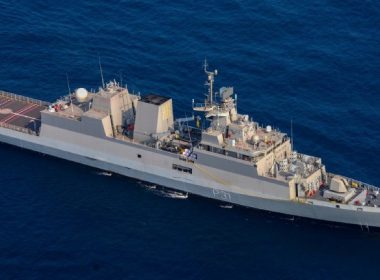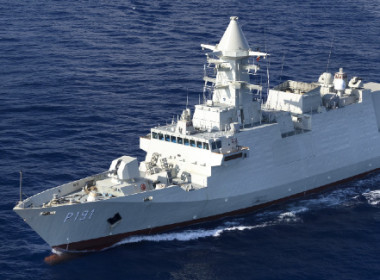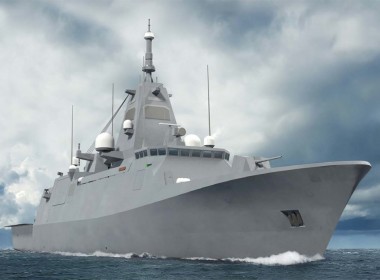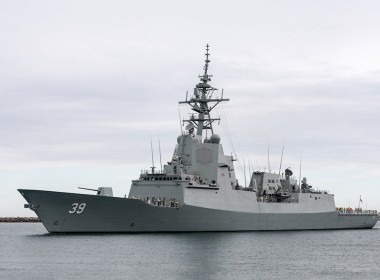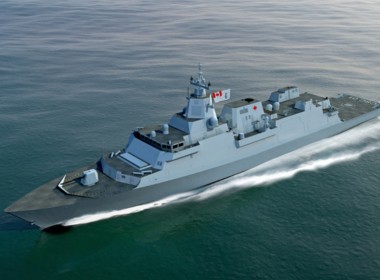OPINION | To corvette or to not corvette: the defence strategic review and the Tier 2 surface combatant

A key part of the government’s response to the defence strategic review (DSR) was the establishment of an independent analysis team to examine the Royal Australian Navy’s surface combatant fleet and to report back to government by the end of September 2023.
The framework for the analysis team’s work comes from some clear DSR directives. The DSR calls for an “enhanced lethality surface fleet”; a greater number of Tier 2 surface combatants; and a fleet mix that considers capability needs, cost, schedule and risk as well as the need for continuous shipbuilding.
More broadly, the surface fleet must be aligned with the DSR’s strategy of deterrence by denial, the critical capabilities list and the focus on a denial strategy, as well as on operations in the littorals and archipelagos in Australia’s approaches. This needs to be married with the DSR’s call to get capabilities into service without delay, the streamlining of strategically important capabilities and an emphasis on minimal viable capability given the end of strategic warning time.
In terms of the work of the analysis team, a key question is: what is a Tier 2 combatant? As ASPI’s Jennifer Parker has expertly outlined, this is less about the nomenclature of naval vessels and more about the capabilities they deliver. That said, the public debate over the requirement for a larger number of smaller vessels has largely settled on corvette/light frigate options. “Corvette” has by and large become the de rigueur term in the debate for the Tier 2 surface combatant option.
Opting for an “enhanced lethality” surface combatant fleet raises the question of whether the navy’s offshore patrol vessel (OPV) program should continue in its current form. With six of the intended 12 OPVs built or under construction by German shipbuilder Luerssen, the company has proposed to the government that it build the remaining six to a corvette design.
“Luerssen’s corvette option would provide the RAN with a vessel as capable, if not more, than the current Anzac-class frigate, but with a massively reduced crewing requirement.”
Options for “Tier 2” surface combatant have been put forward by a number of companies, including Navantia and TKMS. Depending on the analysis team’s broader recommendations, the government will need to find funds for these vessels within the current naval shipbuilding program, carve out additional savings elsewhere within Defence, or allocate additional funds to pay for them.
Apart from finding the funding for a larger fleet of Tier 2 surface combatants, the government will have to deal with the potential capability gap in the surface fleet caused by the cancellation of part of the program and sequence the acquisition and build in a way that ensures the workforces at the Henderson and Osborne shipyards in Western Australia and South Australia are sustained.
However, there may well be an option that meets the DSR’s strategic requirements and its emphasis on speed to capability now, along with the navy’s needs and the ability to maintain continuous shipbuilding—Luerssen’s C90 corvette.
The C90 represents a very credible option for Defence to consider. Its base capability features in the Luerssen proposal include 16 vertical launch cells, eight anti-ship missiles, integration of a CEA radar, a hull-mounted sonar, a towed sonar array, torpedoes and a helicopter. The design would need to be modified to accommodate the RAN’s next-generation MH-60R Seahawk.
Most significantly, the C90 is already in production for the Bulgarian navy and Luerssen believes the C90 base design provides robust, production-ready vessels that can be easily modified for Australia’s needs. This option would provide the RAN with a vessel as capable, if not more, than the current Anzac-class frigate, but with a massively reduced crewing requirement.
“The C90 provides a significant platform for consideration and, in terms of speed to capability, it would be hard to beat.”
The Anzac frigate’s capability requirements were originally set out in the 1986 Dibb review and the 1987 defence white paper. The latter noted the need for a second level of surface warship comprising vessels of lesser capability than guided missile destroyers and the frigates then in service. They would be “suitable for dealing with lesser forms of military pressure which could arise in Australia’s resource zones and proximate waters or in Australia’s area of direct military interest. A new class of vessel—a light patrol frigate—has been proposed for this level of capability. Eight ships will be constructed in Australia.”
| Anzac-class frigate | MMPS C90 base design | |
| Range | 6,000 nautical miles | 6,000 nautical miles |
| Crew | 169 | 68 |
| Speed | 27 knots | 22 knots |
| Radar | Original fit: Raytheon SPS-49(V)8 ANZ aerial search and long-range surveillance, Saab 9LV Combat Management System, Saab Sea Giraffe Target Indication Radar for air and surface search, Krupp Atlas 9600 Navigation RADAR, Saab9LV 453 Ceros 200 Fire Control Radar and Continuous Wave Illuminator | 1 X 3D active phased array radar; Proposed CEA Radar integration; Saab Combat system |
| Sonar | ThomsonSintra Spherion B hull-mounted bow sonar, Petrel Mine and Obstacle Avoidance Sonar system, towed-array sonar | Hull mounted sonar 1X DSIT Blackfish HMS and towed array sonar 1 X TAS |
| Hull board | All steel construction | High-tensile steel |
| Torpedo | 2 x Mk32 Mod 5 triple-mounted torpedo tubes | Torpedo launchers 2X B515-3T |
| Gun | 5-inch Mk45 Mod 2 automatic rapid fire gun, 4 x .50-calibre (12.7mm) machine guns | Medium-calibre gun 1X 76/62 super rapid MF Oto Melara; secondary gun: 1 X35mm Rheinmetall Millennium |
| VLS System | Mk 41 vertical launch system (8 cells) | 1 VLS Mk 41 (16 Cells) |
| Helicopter | 1 x MH-60R Seahawk | Medium-sized navy helicopter |
| SS Missiles | 8 surface-to-surface missiles | 8 surface-to-surface missiles |
| Sensors | Raytheon SPS-49(V)8 ANZ radar, Saab 9LV 453 Target Indication Radar, Atlas Elektronik 9600 ARPA navigational radar, second Saab 9LV 453 | Multi-purpose radar, electro-optical surveillance system, electronic warfare systems |
The C90 option provides significant advantages. The company already has a contract with Defence for the OPVs, including a workforce and shipyard requiring limited changes to convert from building the OPVs to C90s. It also has an established and secure supply chain with local industry. In addition, the first of the OPVs were built at Osborne, and, if necessary, corvettes could be built concurrently in both Henderson and Osborne, delivering speed to capability and effectively engaging the Osborne workforce if this was required.
The C90 represents one of several options that the analysis team and Defence should consider as the Tier 2 surface combatant. While this is by no means an assured outcome, it does provide a significant platform for consideration and, in terms of speed to capability, it would be hard to beat.
The author was co-lead of the DSR secretariat. He has no knowledge of, or engagement with, the work of the independent analysis team. The views presented here are those of the author alone and do not, in any way, represent those of the DSR, the independent leads, the Department of Defence, or the Commonwealth of Australia. The author was a guest of Luerssen Australia for a site visit to its C90 and K130 corvettes.


